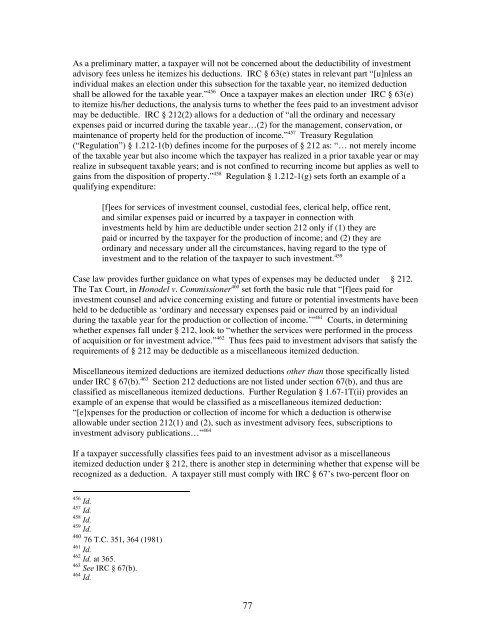Volume IV, Issue II (April 2006) - Columbus School of Law
Volume IV, Issue II (April 2006) - Columbus School of Law
Volume IV, Issue II (April 2006) - Columbus School of Law
Create successful ePaper yourself
Turn your PDF publications into a flip-book with our unique Google optimized e-Paper software.
As a preliminary matter, a taxpayer will not be concerned about the deductibility <strong>of</strong> investmentadvisory fees unless he itemizes his deductions. IRC § 63(e) states in relevant part “[u]nless anindividual makes an election under this subsection for the taxable year, no itemized deductionshall be allowed for the taxable year.” 456 Once a taxpayer makes an election under IRC § 63(e)to itemize his/her deductions, the analysis turns to whether the fees paid to an investment advisormay be deductible. IRC § 212(2) allows for a deduction <strong>of</strong> “all the ordinary and necessaryexpenses paid or incurred during the taxable year…(2) for the management, conservation, ormaintenance <strong>of</strong> property held for the production <strong>of</strong> income.” 457 Treasury Regulation(“Regulation”) § 1.212-1(b) defines income for the purposes <strong>of</strong> § 212 as: “… not merely income<strong>of</strong> the taxable year but also income which the taxpayer has realized in a prior taxable year or mayrealize in subsequent taxable years; and is not confined to recurring income but applies as well togains from the disposition <strong>of</strong> property.” 458 Regulation § 1.212-1(g) sets forth an example <strong>of</strong> aqualifying expenditure:[f]ees for services <strong>of</strong> investment counsel, custodial fees, clerical help, <strong>of</strong>fice rent,and similar expenses paid or incurred by a taxpayer in connection withinvestments held by him are deductible under section 212 only if (1) they arepaid or incurred by the taxpayer for the production <strong>of</strong> income; and (2) they areordinary and necessary under all the circumstances, having regard to the type <strong>of</strong>investment and to the relation <strong>of</strong> the taxpayer to such investment. 459Case law provides further guidance on what types <strong>of</strong> expenses may be deducted under § 212.The Tax Court, in Honodel v. Commissioner 460 set forth the basic rule that “[f]ees paid forinvestment counsel and advice concerning existing and future or potential investments have beenheld to be deductible as ‘ordinary and necessary expenses paid or incurred by an individualduring the taxable year for the production or collection <strong>of</strong> income.’” 461 Courts, in determiningwhether expenses fall under § 212, look to “whether the services were performed in the process<strong>of</strong> acquisition or for investment advice.” 462 Thus fees paid to investment advisors that satisfy therequirements <strong>of</strong> § 212 may be deductible as a miscellaneous itemized deduction.Miscellaneous itemized deductions are itemized deductions other than those specifically listedunder IRC § 67(b). 463 Section 212 deductions are not listed under section 67(b), and thus areclassified as miscellaneous itemized deductions. Further Regulation § 1.67-1T(ii) provides anexample <strong>of</strong> an expense that would be classified as a miscellaneous itemized deduction:“[e]xpenses for the production or collection <strong>of</strong> income for which a deduction is otherwiseallowable under section 212(1) and (2), such as investment advisory fees, subscriptions toinvestment advisory publications…” 464If a taxpayer successfully classifies fees paid to an investment advisor as a miscellaneousitemized deduction under § 212, there is another step in determining whether that expense will berecognized as a deduction. A taxpayer still must comply with IRC § 67’s two-percent floor on456 Id.457 Id.458 Id.459 Id.460 76 T.C. 351, 364 (1981)461 Id.462 Id. at 365.463 See IRC § 67(b).464 Id.77
















